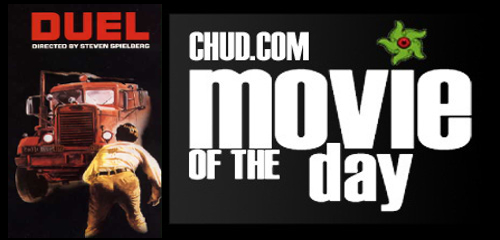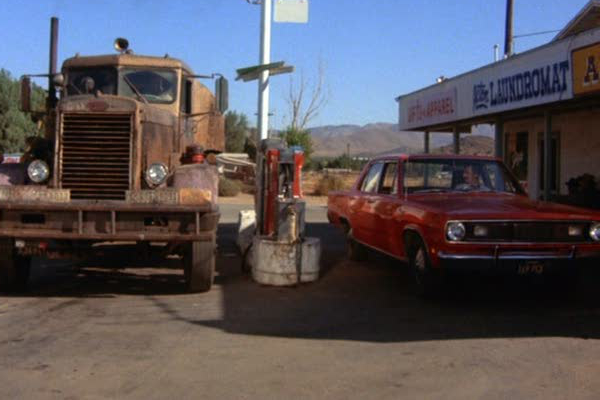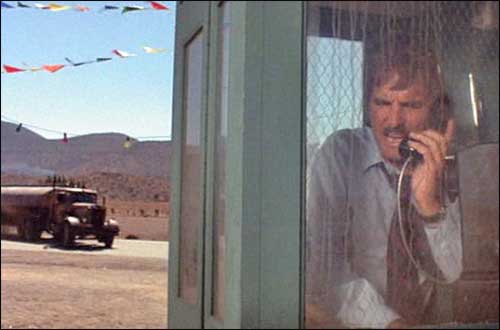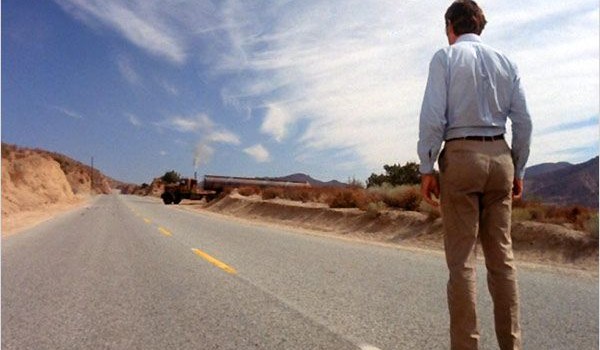The Film: Duel (1971)
The Principals: Steven Spielberg (first-time director), Richard Matheson (writer), Dennis Weaver (actor)
The Premise: A milquetoast salesman finds himself stalked on California highways by a vicious, relentless, and potentially supernatural tanker truck.
Is it any good? Absolutely – not only is it a piece of cinematic history, it may be most consequential made-for-TV movie ever.
I was compelled to revisit Duel upon the death of Richard Matheson, who adapted the film’s teleplay from his own short story (which in turn was inspired by a semi-autobiographical experience). It’s not Matheson’s best work (and of course it’s not Spielberg’s), but it’s very effective for what it is, and what it sets out to do. Put simply – a 1971 TV movie of the week should not be this good. What Spielberg was able to do while working within these low-budget confines on a severely limited shooting schedule cannot be underestimated – especially at a time when TV was, frankly, viewed as a ghetto. Spielberg (only 24 at the time) shot this with the same care, precision, and visual dynamism that we’ve come to take for granted from him. There are moments here that foreshadow Spielberg’s later work – the truck falling off a cliff, a tracking shot swooping around a car, an implacable adversary versus an everyman, and (in one memorable scene) way too many snakes. In less-assured hands, this premise could easily turn out lackluster and repetitive; and it’s to the young Spielberg’s credit that he makes us care, keeps the pace consistent, and keeps things visually engaging.
While the movie isn’t perfect (the head-smackingly obvious thought voiceover in the diner, for instance), it’s consistently engaging. Matheson’s script provides a sturdy framework of steadily increasing stakes with deft exposition and remarkably little padding, and provides just enough detail about the protagonist that we understand who he is and relate to his struggle. David Mann (Dennis Weaver) is written in broad, archetypal strokes, but he still seems recognizably human; and there’s slyness in the way Duel tackles its themes of male aggression and identity. And while Weaver isn’t the flashiest of actors, that quality makes him great for the role, and he manages to hold the screen alone for much of the movie. He starts the movie as a man who routinely avoids confrontation, and over the course of one hellish day, learns how to face death head-on.
Taken on its own, Duel is simply a fun little movie in the Twilight Zone-vein. But in retrospect, it’s a fascinating look at how the most successful director of all time got his start, working with a script from one of our most influential writers.
Either would be a good reason to check it out.
Random anecdotes: The movie was shot in 13 days, all of it on location. After 10 days of editing, it aired on ABC.
Upon its successful TV airing, Spielberg was enlisted to shoot two days’ worth of additional scenes that pumped the run-time from 74 minutes to 90; and the movie was released theatrically overseas and with a limited US release.
Technically Spielberg’s second feature-length directing effort, after an episode of the TV series “Name of the Game” that ran for 76 minutes. The title of this episode is “LA 2017”, and is currently unavailable.
One of the only two Spielberg-directed films to not feature a John Williams score. (The Color Purple is the second.)
I have to wonder what someone like Jack Lemmon would’ve been like in the role … but again, made for TV.
Cinematic Soulmates: Jaws. Christine. Speed. I Am Legend.



